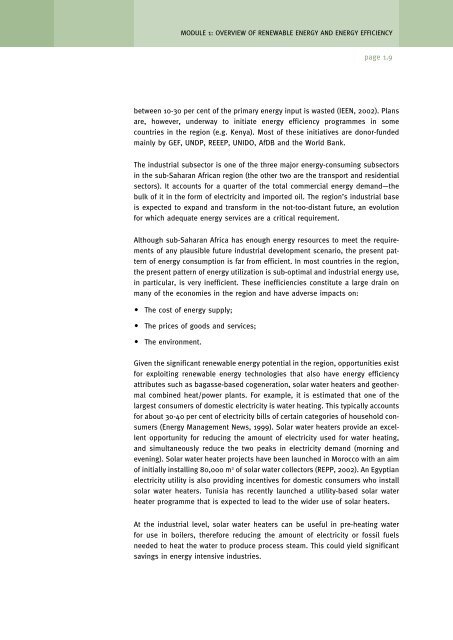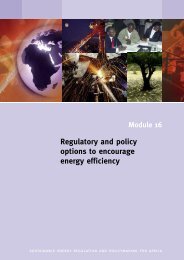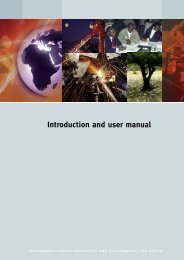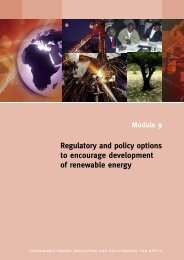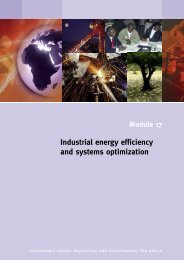Overview of renewable energy and energy efficiency - unido
Overview of renewable energy and energy efficiency - unido
Overview of renewable energy and energy efficiency - unido
- No tags were found...
Create successful ePaper yourself
Turn your PDF publications into a flip-book with our unique Google optimized e-Paper software.
MODULE 1: OVERVIEW OF RENEWABLE ENERGY AND ENERGY EFFICIENCYpage 1.9between 10-30 per cent <strong>of</strong> the primary <strong>energy</strong> input is wasted (IEEN, 2002). Plansare, however, underway to initiate <strong>energy</strong> <strong>efficiency</strong> programmes in somecountries in the region (e.g. Kenya). Most <strong>of</strong> these initiatives are donor-fundedmainly by GEF, UNDP, REEEP, UNIDO, AfDB <strong>and</strong> the World Bank.The industrial subsector is one <strong>of</strong> the three major <strong>energy</strong>-consuming subsectorsin the sub-Saharan African region (the other two are the transport <strong>and</strong> residentialsectors). It accounts for a quarter <strong>of</strong> the total commercial <strong>energy</strong> dem<strong>and</strong>—thebulk <strong>of</strong> it in the form <strong>of</strong> electricity <strong>and</strong> imported oil. The region’s industrial baseis expected to exp<strong>and</strong> <strong>and</strong> transform in the not-too-distant future, an evolutionfor which adequate <strong>energy</strong> services are a critical requirement.Although sub-Saharan Africa has enough <strong>energy</strong> resources to meet the requirements<strong>of</strong> any plausible future industrial development scenario, the present pattern<strong>of</strong> <strong>energy</strong> consumption is far from efficient. In most countries in the region,the present pattern <strong>of</strong> <strong>energy</strong> utilization is sub-optimal <strong>and</strong> industrial <strong>energy</strong> use,in particular, is very inefficient. These inefficiencies constitute a large drain onmany <strong>of</strong> the economies in the region <strong>and</strong> have adverse impacts on: The cost <strong>of</strong> <strong>energy</strong> supply; The prices <strong>of</strong> goods <strong>and</strong> services; The environment.Given the significant <strong>renewable</strong> <strong>energy</strong> potential in the region, opportunities existfor exploiting <strong>renewable</strong> <strong>energy</strong> technologies that also have <strong>energy</strong> <strong>efficiency</strong>attributes such as bagasse-based cogeneration, solar water heaters <strong>and</strong> geothermalcombined heat/power plants. For example, it is estimated that one <strong>of</strong> thelargest consumers <strong>of</strong> domestic electricity is water heating. This typically accountsfor about 30-40 per cent <strong>of</strong> electricity bills <strong>of</strong> certain categories <strong>of</strong> household consumers(Energy Management News, 1999). Solar water heaters provide an excellentopportunity for reducing the amount <strong>of</strong> electricity used for water heating,<strong>and</strong> simultaneously reduce the two peaks in electricity dem<strong>and</strong> (morning <strong>and</strong>evening). Solar water heater projects have been launched in Morocco with an aim<strong>of</strong> initially installing 80,000 m 2 <strong>of</strong> solar water collectors (REPP, 2002). An Egyptianelectricity utility is also providing incentives for domestic consumers who installsolar water heaters. Tunisia has recently launched a utility-based solar waterheater programme that is expected to lead to the wider use <strong>of</strong> solar heaters.At the industrial level, solar water heaters can be useful in pre-heating waterfor use in boilers, therefore reducing the amount <strong>of</strong> electricity or fossil fuelsneeded to heat the water to produce process steam. This could yield significantsavings in <strong>energy</strong> intensive industries.


